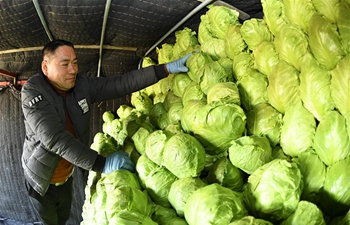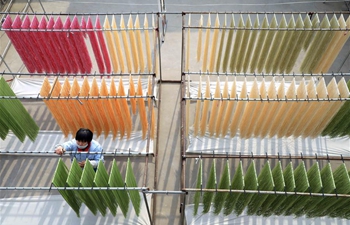by Abdul Haleem, Chen Xin
KABUL, Jan. 31 (Xinhua) -- Afghan businessman Yahya Khan Zadran is seeking more ways and means to increase the export of pine nuts to markets in China.
"We have exported up to 1,300 tons of pine nuts to China over the past few months and I am hopeful the export of the precious seeds will go up," Zadran, President of the Afghanistan Pine Nuts Union, told Xinhua in an interview recently.
"It was difficult to export pine nuts to China in the past, but the inauguration of the Afghan-China air corridor has facilitated Afghanistan to export its pine nuts to our neighboring country easily," added Zadran, who is the co-founder and president of the Pine Nuts Union in his country.
The Afghan-China air corridor, inaugurated by President Mohammad Ashraf Ghani and Kabul-based Chinese diplomats on Nov. 6 last year, has prompted Afghan pine nuts traders to focus on Chinese markets, with the first flight containing 20 tons of pine nuts leaving Kabul for China on the same day.
The Afghanistan government is hoping to earn up to 800 million U.S. dollars annually through exporting its pine nuts to China.
Pine nuts trees grow in eight eastern provinces of Afghanistan, including Khost, Paktia, Paktika, Kapisa, Kunar, Nangarhar, Nuristan and Laghman, the head of the Afghanistan Pine Nuts Union said.
According to the official, there are 40 registered small and medium pine nuts trading companies in the mountainous country, with more than 50,000 local farmers, mostly women, involved in growing and harvesting the valuable seeds from nearby forests and hilltops.
Local residents in Afghanistan's eastern provinces have no regular sources of income as they lack enough agricultural land, Zadran said, adding that the pine nuts forests can play a great role in their daily economic life.
"By making new plans, strategies and modernizing the pine nuts industry, we hope more people would become engaged in collecting, processing, packing, planting and exporting the seeds and benefit from the business of these natural resources," Zadran told Xinhua.
Both the union and the government, according to the official, have pledged to work together to provide more employment opportunities to locals in the pine nuts business in the future.
"China can provide more markets for Afghanistan pine nuts than any other countries," Zadran said.
Afghanistan and its international friends, especially Chinese traders and officials, can do more to find good markets for the Afghan pine nuts in China, the president of the Afghanistan Pine Nuts Union said.
"In my opinion, China's markets have a great potential to consume Afghan pine nuts. The Chinese markets have provided a good opportunity for Afghanistan's pine nuts industry and nowadays we have the capacity to export pine nuts to China."
"But there are problems and challenges here on our side," added the union chief.
According to the Pine Nuts Union chief, Afghan trade officials have discussed packing pine nuts on the Chinese side.
"We are thankful to our Chinese friends who have noticed our problems and accepted that due to some problems, pine nuts could only be exported with simple packaging," explained Zadran.
Afghanistan, the businessman said, can produce approximately 35,000 tons of pine nuts annually.
However, he noted that the figure didn't show the exact amount of pine nuts harvested in Afghanistan, because the "illegal export of the valuable seeds to neighboring Pakistan" is continuing via the porous and unchecked borders.
According to Zadran, factors such as non-standard packing systems, lack of processing factories and insecurity are among key challenges that have hindered the pine nuts industry and resulted in illegal export of the seeds to neighboring countries.
"The Afghanistan Pine Nuts Union is working jointly with the government, international friends and local traders to chalk out a national strategy for the development of the pine nuts industry and prevent its illegal export," Zadran said.













